The beginnings of a Roman settlement in southern Gaul

Working in advance of construction on a high school dormitory in the town of Uzès in southern France, archaeologists have discovered, at the town’s periphery, the remains of an early Roman settlement named Ucetia dating to the first century B.C.. Researchers have found evidence there of both Celtic and Roman dwellings. Located in an arid region close to the Mediterranean, Ucetia was previously only known from an inscription on a stela in the nearby city of Nîmes.
Today, visitors flock to the famed market villages of Le Gard, a district within southern France’s Occitanie region. Uzès is one of them. Until 2017, however, the location of Ucetia, which gave Uzès its name, remained an enigma. The town was thought to perhaps have been destroyed or obscured by later building throughout the centuries. In an excavation that covers several acres, archaeologists from the French National Institute of Preventive Archaeological Research (INRAP), have now identified Ucetia just north of and outside Uzès’ medieval walls. They have unearthed an urban footprint that dates back to before the Roman invasion of Gaul in the first century B.C.. and extends into the early Middle Ages. The site’s fortuitous location outside the main walls of the modern town is giving scholars an opportunity to trace the early phases of Roman urbanization in the region, at a slight remove from the town’s later development.
Diese Geschichte stammt aus der November/December 2017-Ausgabe von Archaeology.
Starten Sie Ihre 7-tägige kostenlose Testversion von Magzter GOLD, um auf Tausende kuratierte Premium-Storys sowie über 8.000 Zeitschriften und Zeitungen zuzugreifen.
Bereits Abonnent ? Anmelden
Diese Geschichte stammt aus der November/December 2017-Ausgabe von Archaeology.
Starten Sie Ihre 7-tägige kostenlose Testversion von Magzter GOLD, um auf Tausende kuratierte Premium-Storys sowie über 8.000 Zeitschriften und Zeitungen zuzugreifen.
Bereits Abonnent? Anmelden
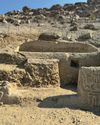
ORIGINS OF PERUVIAN RELIGION
While investigating looters' holes at the site of La Otra Banda in northern Peru's Zaña Valley, archaeologist Luis A. Muro Ynoñán of the Field Museum and the Pontifical Catholic University of Peru spotted carved blocks around seven feet below the surface.
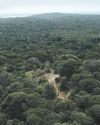
ISLAND OF FREEDOM
Many of the enslaved Africans sent to Brazil beginning in 1549 were from what is now Angola, where one of the most widely spoken languages was Kimbundu.
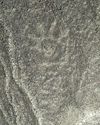
NAZCA GHOST GLYPHS
From the 1940s to the early 2000s, geoglyphs were discovered in the Nazca Desert of southern Peru depicting animals, humans, and other figures at the rate of 1.5 per year.

COLONIAL COMPANIONS
The ancestry of dogs in seventeenth-century Jamestown offers a window into social dynamics between Indigenous people and early colonists.
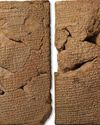
BAD MOON RISING
The British Museum houses around 130,000 clay tablets from ancient Mesopotamia written in cuneiform script between 3200 B.C. and the first century A.D.
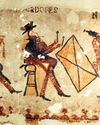
DANCING DAYS OF THE MAYA
In the mountains of Guatemala, murals depict elaborate performances combining Catholic and Indigenous traditions
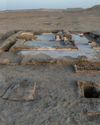
LOST GREEK TRAGEDIES REVIVED
How a scholar discovered passages from a great Athenian playwright on a discarded papyrus

Medieval England's Coveted Cargo
Archaeologists dive on a ship laden with marble bound for the kingdom's grandest cathedrals
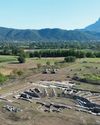
Unearthing a Forgotten Roman Town
A stretch of Italian farmland concealed one of the small cities that powered the empire
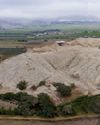
TOP 10 DISCOVERIES OF 2024
ARCHAEOLOGY magazine reveals the year's most exciting finds